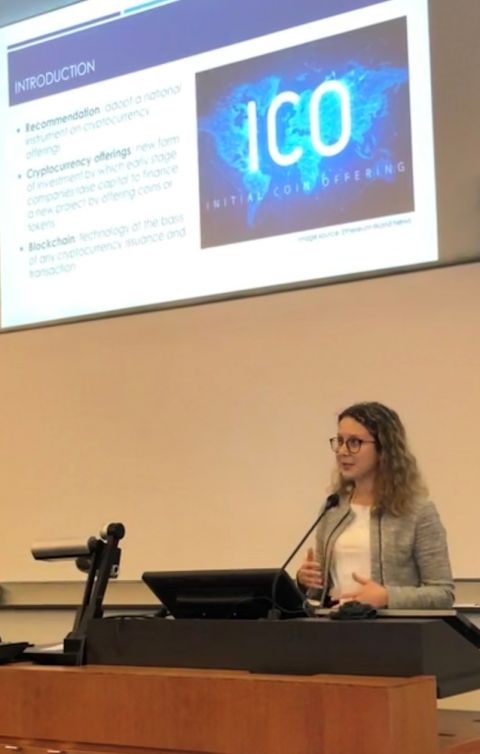
Cryptocurrency, a digital currency that uses cryptography for security and anti-counterfeiting measures, is becoming increasingly popular for online transactions. However, there is a gap in Canada’s securities regulation for cryptocurrency offerings – and that sparked LLM candidate Catherine Rousseau’s idea for her thesis. Her research has now caught the attention of a wider audience. She was selected to participate in “Innovation in Law & Policy,” the 23rd Annual UBC Interdisciplinary Legal Studies Graduate Student Conference. On May 2 in Vancouver, she presented her paper, “ICOs and ITOs in Canada: Why and How Should We Modernize the Securities Law Framework?”
Catherine Rousseau, who holds a civil law degree from her hometown’s Université de Montréal, shares her research interest and conference experience.
How did you develop your interest in your research area?
I developed a high interest for securities law when working as a law student at the legal affairs department of Quebec’s securities commission (Autorité des marchés financiers). I had the opportunity to conduct research on regulatory developments in securities and derivatives law. This experience made me aware of the necessity to adapt regulation as new types of investments related to the development of technologies are emerging. I had heard a lot of cryptocurrency offerings throughout the years and wanted to deepen my knowledge on the legal issues surrounding this question as I felt there were many gaps that needed to be addressed.
Tell us about your research.
The research I conducted addresses the issues around securities regulation and cryptocurrency offerings, more precisely initial coin offerings and initial token offerings (ICOs and ITOs). A cryptocurrency offering is a new form of investment by which early-stage companies raise capital to finance a new online project. In exchange for the funds they receive, these companies create and issue a new digital coin or token that is meant to support and be used on the platform created. The coin or token is created and issued to investors with the help of blockchain technology. Blockchain allows secure peer-to-peer transactions by storing data in a decentralized, public and encrypted online ledger.
My thesis is that Canadian securities regulation, which regulates investments and capital markets, should be modernized and adapted to cryptocurrency offerings. More precisely, I argue that a national instrument on cryptocurrency offerings should be adopted. In my paper, I first analyze the main risks associated with investing in cryptocurrency offerings, including the risks of fraud, failure, and cybersecurity. I then address the current securities law framework that applies to cryptocurrency offerings and the issues with this legal framework. Lastly, I present my suggested improvements, which relate to the creation of a national securities regulation on cryptocurrency offerings that would provide for exemptions from the general framework and establish requirements tailored to the particularities of cryptocurrency offerings.
How did you get selected to present your paper at the UBC Conference?
A colleague of mine told me about the call for papers for UBC Conference. I submitted my abstract to the conference committee and got selected to participate on the Law, Blockchain & Disruptive Technologies panel. I had the chance to share this panel with four other brilliant women from Columbia, UBC, and Yale.
Explain any ways in which participating in the conference helped your work.
Participating in the conference gave me the opportunity to meet other graduate students from Canada and elsewhere and to discuss our respective research. I got useful feedback and questions from my colleagues that gave me ideas about how to make my argument clearer and more convincing.
Why did you choose Queen’s Law for your LLM studies?
I chose Queen’s Law for the reputation of the program, the expertise in securities law, the specialized courses offered in my fields of interest, the small class size, the possibility to pursue a course-paper option and for the opportunity to conduct research in an English speaking environment.